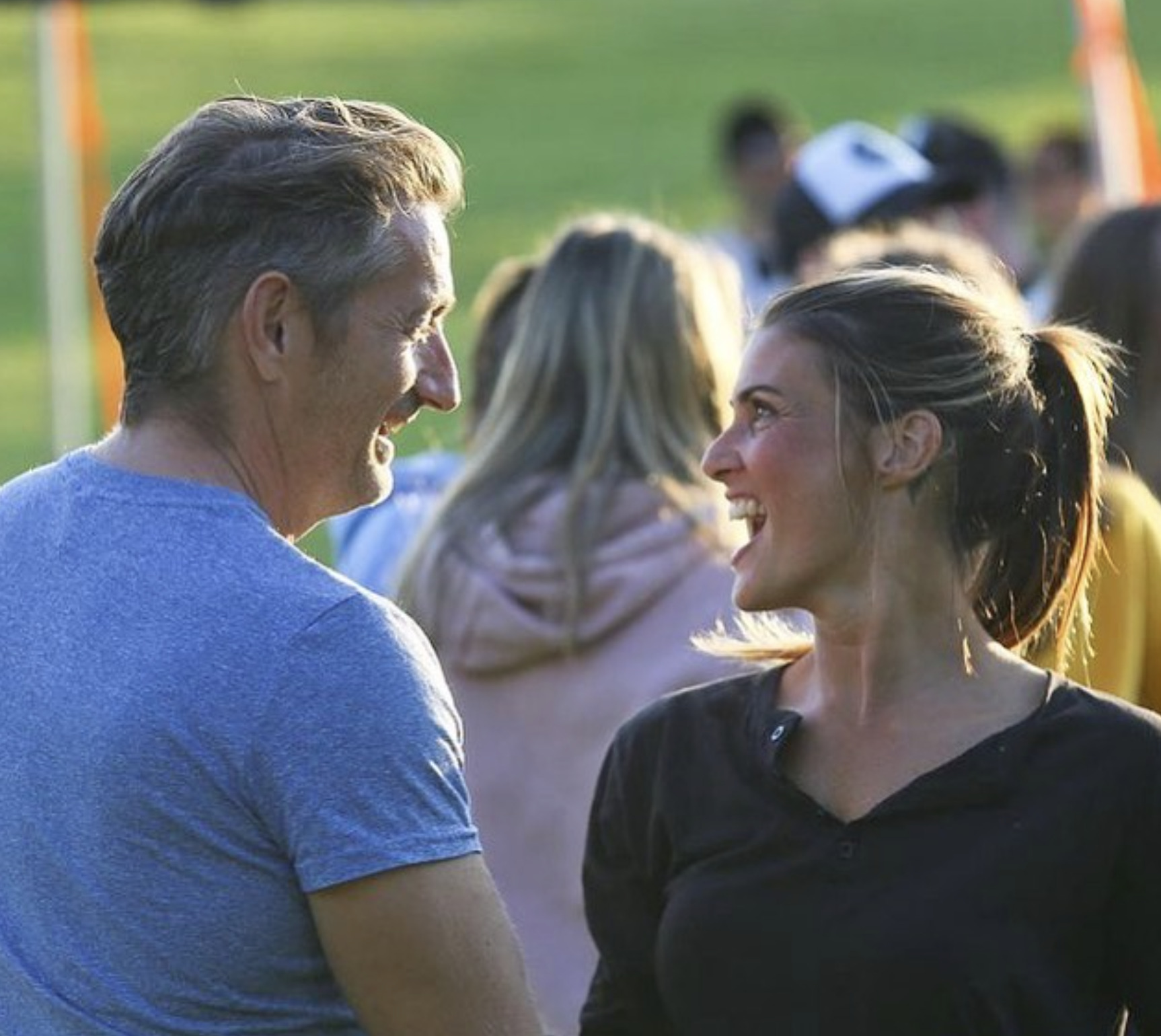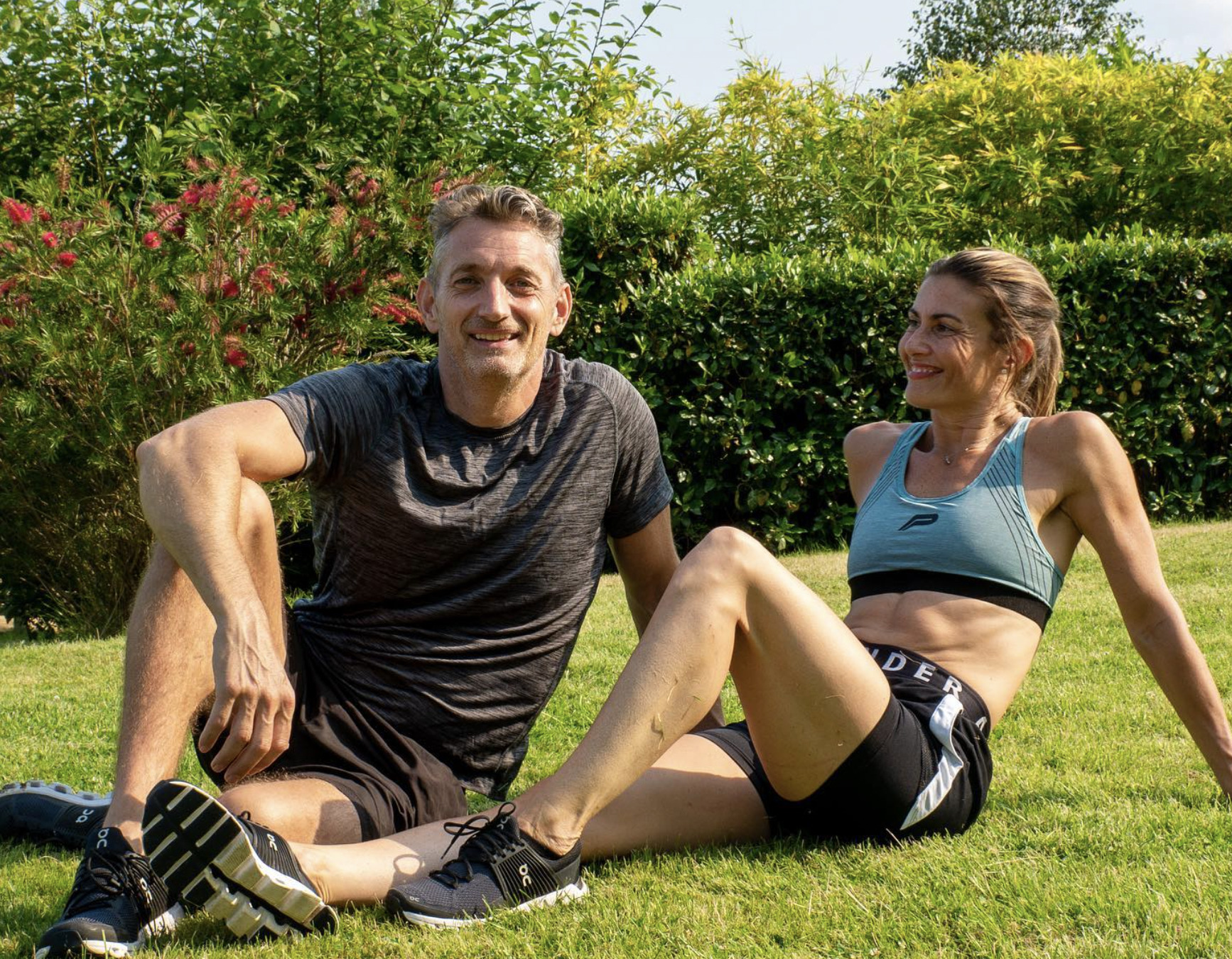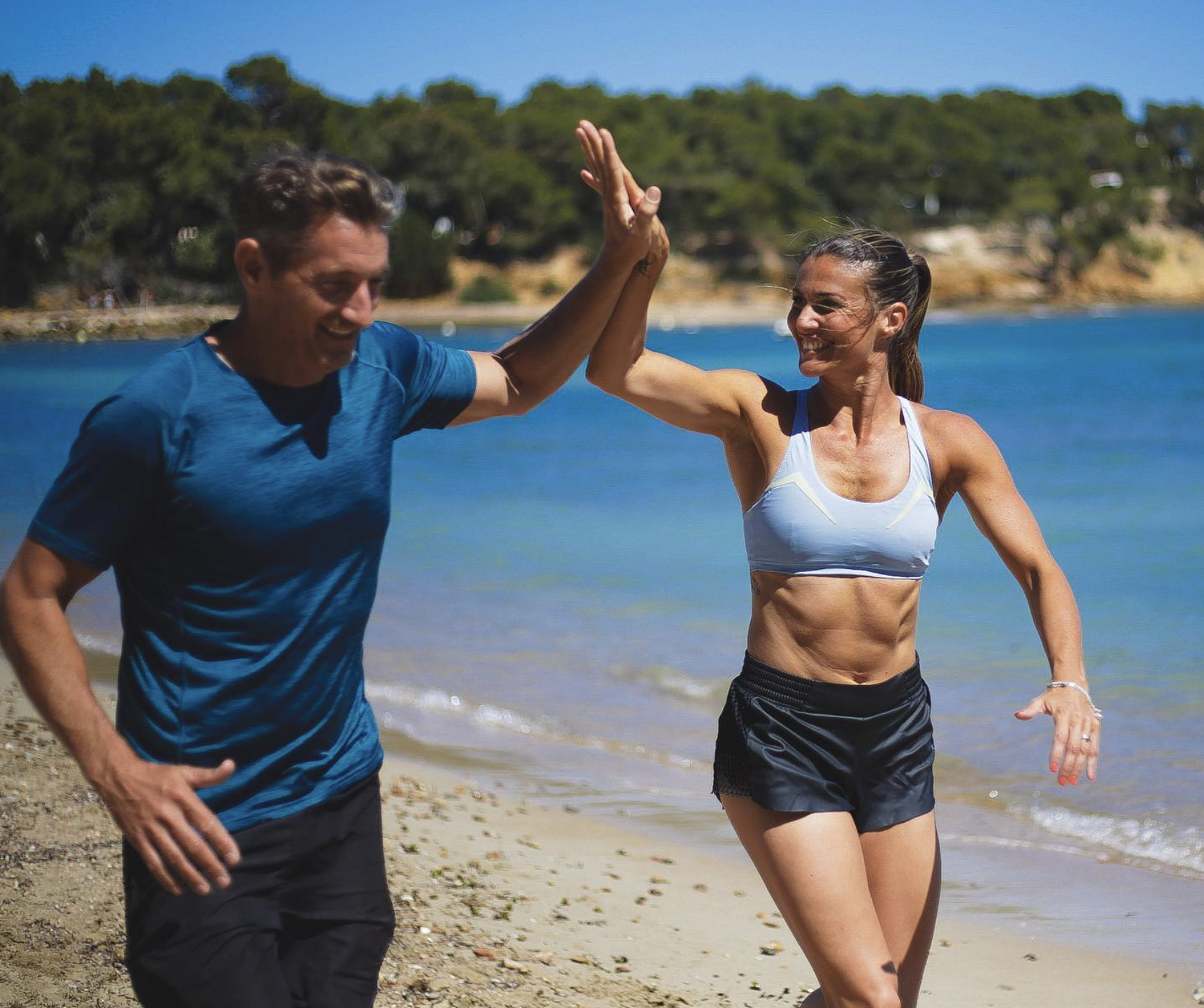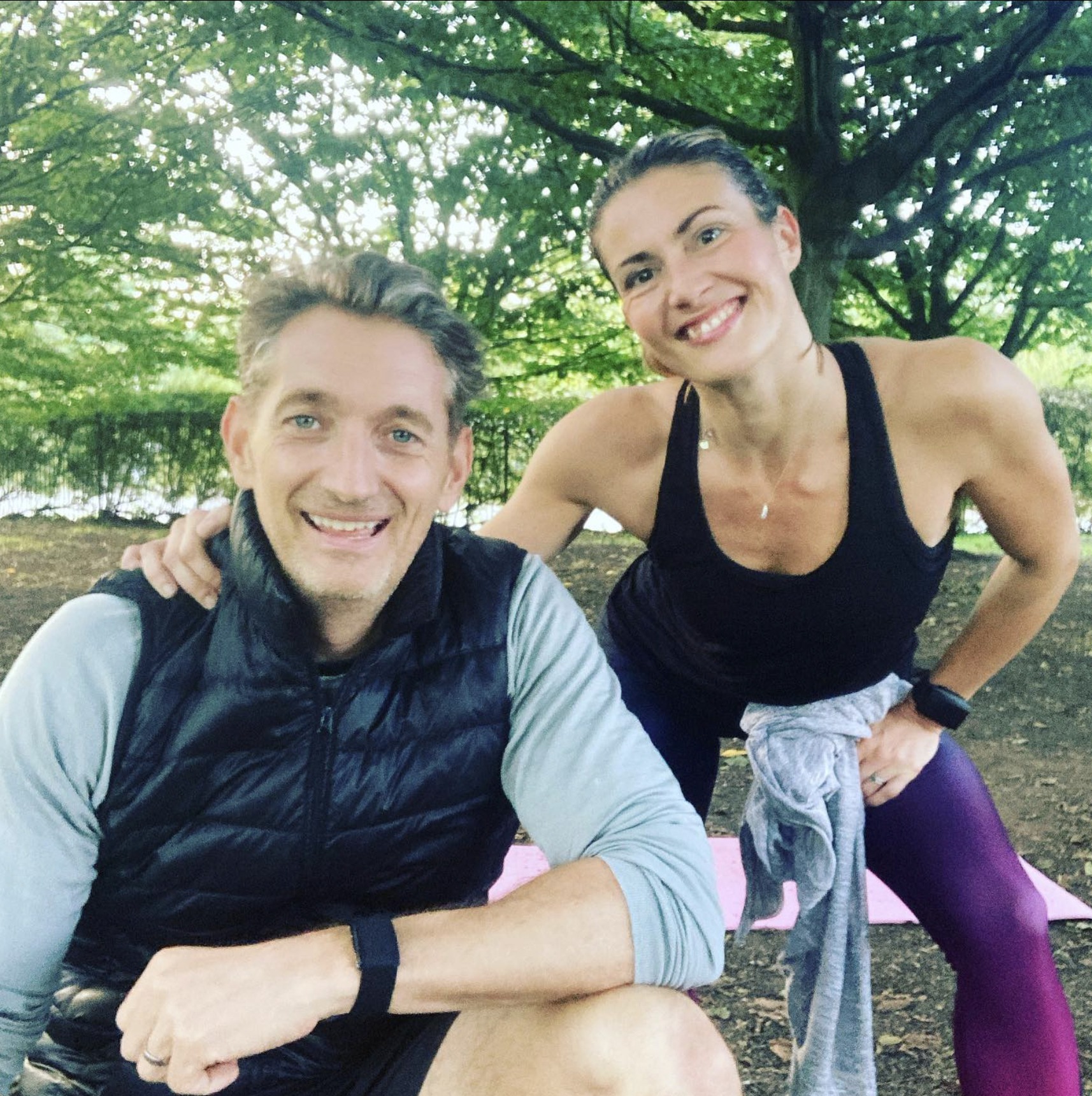It seems that the pandemic brought on a tidal wave of life changes, and one of them was midlife divorce. James, 50, and Claire Davis, 44, were both divorced and faced with the usual range of midlife quandaries when they found one another. They combined their expertise to create a midlife coaching program to help others live their best life. Excelling in midlife means taking care of one’s body and one’s mind; it means approaching things differently than we did when we were younger.
You were both divorced before meeting each other. What did you learn from that experience?
So much! We each had our own individual journey, but I think for both of us it was quite similar. When a long-term relationship ends at midlife it can have a devastating effect on your self-confidence, even your identity.
Both of us, for a long time after our separations, struggled with self-confidence and a feeling of worth. I think at midlife there’s a tendency to think that maybe you’re on the scrap heap, that you’ve been rejected and now no one else will want you, but that’s definitely not true.
For both of us it was a question of doing the work to build that sense of confidence and worth back up, so that by the time we came together we felt like we’d repaired and rebuilt ourselves a lot.
Of course the very next lesson we learned was that we hadn’t done enough and we carried a whole lot of baggage into the relationship with us that made things really tough.
However, it always felt, no matter how hard it got, that there was something better on the other side, that what we’d found with each other, no matter how painful it was in the moment, that the relationship was worth fighting for, and committing to do more work.

Ultimately, a relationship requires investment, both in yourself and in the relationship. We both wanted to come out better people, yes, for ourselves, but also for each other.
I guess we kind of doubled down by also deciding to work together very early on, which made it interesting at times! It was certainly intense, but that intensity helped accelerate us to where we are today, so we can look back and be grateful for the painful lessons because of the rewards they delivered.
All too often people will look for the easy way, but easy is often not better, and the majority of times the hard way is going to build the character and experience you need. It certainly built our relationship into something even more solid.
For anyone going through a midlife divorce or separation, we’d say there is light at the end of the darkness and, in fact, you can use it to redefine who you want to be and commit to not only becoming the person you want to be, but having the relationship you want, with the person you want. But it is going to require you to look at yourself and where you might still need healing. Where you might be projecting your own past hurts into the present relationship.
“We have a deep understanding of the role of mindset and how it plays into creating long-term, sustainable change”
What are your backgrounds?
James’ background was originally in psychology, he later up-skilled in personal training, nutrition, hormones, and gut health and became a master coach.
Claire’s background was stress management, life and business coaching and NLP, before she too became a personal trainer and qualified in nutrition.
We are also both menopause practitioners because we both wanted to support our female clients on a deeper level.
The variety and blend of our experience has given us a distinct advantage, as we have a deep understanding of the role of mindset and how it plays into creating long-term, sustainable change. We always say it’s 80% psychology, 20% mechanics.
We also understand how the mind and body are inextricably linked. The role nutrition plays in mood, for example, and how hormones at midlife affect you not just physically but mentally.
This means we take a truly holistic approach — encompassing body, mind and soul. We focus on six pillars of midlife health and happiness in our program and we’re all about educating and empowering our clients with small incremental changes so they don’t feel overwhelmed, but can gradually reclaim control of their body, mind and life.
Permission to Prioritize Yourself
When someone comes to you in midlife feeling bad about themselves, maybe from a divorce or other life issues, how do you go about getting them back on track?
We focus on supporting them to give themselves permission to prioritize themselves. After a breakup, or after challenging life issues, it’s easy to lose our way. We can forget who we are, what we like, what makes us happy.
Oftentimes it’s because at midlife we’ve spent decades prioritizing others (children, partners, money, work…) but neglected ourselves. So when life circumstances change it can be very unsettling, confusing and overwhelming. Where do we even start to piece it back together?
So, giving permission to prioritize themselves is key and letting them know it’s safe to do so. We emphasize that this isn’t selfish but quite the opposite. We can’t give from an empty vessel and perhaps this anger in their lives has given them an opportunity to reinvent themselves. It’s about giving themselves the time and support (from us) to thrive.
One of the most powerful things we help them do is establish a routine. A routine that helps bed-in new habits and enables them to regain a sense of control in their life. So we encourage movement, balanced nutrition and mindset tools to start building confidence and self-belief. The mind-body connection is where the magic happens!

We also get our clients to set a vision for not only where they want to be, but who they want to be. We help them feel more open to possibility, to creativity, and to what their legacy might be. We deep-dive into the emotional connection of why they want what they want and why it’s so important to them. Having new, empowering goals is so key at this stage, but so too is an understanding of how to stay grounded in the present and look at what they do have to be grateful for.
This takes away the pressure from the delayed gratification of “destination happiness.” I’ll-be-happy-when syndrome! The process helps them create an actionable, tangible plan forward, as well as psychological tools like shifting limiting beliefs and self-sabotaging behavior. We do a lot on the inner critic!
Finally, it’s about taking consistent, aligned action, and that’s where the accountability and support comes in. When we go on the journey with someone who’s been there and can help us through the rough spots and guide us, it’s so much faster, and easier.
Shifting to More Empowering Beliefs
How are mental and physical confidence linked?
A big mistake people make is focusing just on what we call the external factors: for instance, they’ll go on a diet, or adopt a new workout routine, or do another new course. They may get success for a while, but then, after time passes, they slip back. That’s because society has programmed us to look for the quick fix: the latest diet, the newest supplement, the workout craze, how to make a quick buck!
Of course we need to do the external work, but the real power of transformation comes from looking at our internal systems: our beliefs, habits and self-identity. We always say you cannot out-perform your self-identity. Meaning, we have to think about the stories we tell ourselves because they will be reflected back at us externally. If you think you’re going to struggle to stay in good physical condition, guess what? You will struggle. If you think you’re unable to stay motivated, guess what? You will.

At the end of the day, if you don’t like what you see in the mirror, you can do the physical work to change your body but, chances are, if you’re not doing the mindset reps, you’ll still see imperfection that robs you of your full levels of happiness. When you do the internal work alongside the action steps, then you can build true confidence that lasts — and not slip back into old patterns of behavior.
What we do is work with clients to look at the beliefs they have that could be holding them back and encourage them to shift them to more empowering beliefs and shape a new self-identity. This is how you not only build short-term success, but lock it in.
Once you begin to believe you’re a person that enjoys keeping in good shape, that has a healthy relationship with food, that has a positive mentality, then you won’t have such a problem maintaining that reality. Then your self-belief aligns with the physical. Your body literally follows the more positive orders of the mind! It responds to your happier, healthier thoughts.
How are nutrition, movement, and hormones linked?
Nutrition, movement, and hormones are so interlinked — especially at midlife and beyond. Not only that but your psychology is linked up to it, too.
Hormones and neurotransmitters not only have physical effects on the body, but also affect mood and cognition. That’s why symptoms of the menopause and andropause include physical effects like losing muscle mass and strength, hot flashes, sweats, alongside cognitive factors like loss of focus, forgetfulness, and mood factors like anxiety and low mood.
What we eat can obviously have an effect on our body compositions but it also can directly influence our mood via our gut biomes (aka our second brain) which produce the majority of our neurotransmitters, and we can also better support our hormones through the right eating choices. Conversely, how we feel will influence food choices. For example, when we’re stressed, the hormone cocktail we experience will make us crave high-energy sugary and starchy food, so being aware of this is the first step to taking control.
“Stress acts as a multiplier for all the negative effects of aging we don’t want”
Stress plays a big role in influencing our hormone pathway (depleting our sex hormones, for example), what we eat, our physiology, and our mindset. It acts as a multiplier for all the negative effects of aging we don’t want; so, key for us is helping clients get stress under control.
One way of doing that is through regular exercise. Exercising also produces feel-good neurotransmitters which boost our mood, so this has an effect on our psychology, too. Not only that, but moving our bodies in certain ways, like resistance training, can elicit a positive hormonal response — for example, boosting testosterone temporarily — and at midlife and beyond it’s about training in the right way for our hormone make up, which is shorter workouts with more recovery aimed at supporting our hormones, maintaining muscle mass, and managing body fat levels, as well as keeping our bone density up and ensuring our cardiovascular fitness is good. What we don’t want to do is over train and raise our cortisol by putting our bodies under too much stress.

Really it’s about understanding how all these things are interlinked and the best way of working to create a virtuous cycle where the elements are supporting each other to move you to a place of maximum potential.
Men at Midlife
Men seem to be a special needs group at this age. How do you go about breaking through to them?
All the research says that women are better than men at maintaining and opening up to their social networks, that they’ll seek help earlier, and that they’re more open to therapeutic approaches. This is borne out by the unfortunate stats that men are more likely than women to turn to drink or substances, are less likely to seek help, more likely to bottle up their emotions and feeling and, ultimately, have a higher suicide rate, especially at midlife.
For our generation, I think there’s still a generally held stereotype for men, that they’ve grown up with, that they’re the providers, that they need to be strong and, unfortunately, they’ve equated that strength also equals silence.
At the same time, the andropause is far less talked about than the menopause, and help for men at this stage of life is harder to find.
If we can get men opening up more and talking about how they’re feeling, ultimately we can save lives.
James goes into companies ranging from small agencies with a few dozen employees to multinational finance and banking firms with audiences of thousands, delivering workshops around men’s health issues, the andropause, stress, and relationships, with the ultimate aim of raising awareness, shaping company culture and encouraging men to speak up.
We also have our free podcast where we talk about these issues and give pointers for people, and we run regular free training as well to help people dial in the basics — but we’d love to see more men come along to these!
Midlife Coaching Programs
What sort of online virtual work are you doing?
Our core offering is our 8-week Midlife Method program which is a completely holistic approach for mind and body to dramatically improve their quality of life.
Yes, the program gets great physical results, but for our clients it’s about changing their lives from the inside out. They gain confidence, start building healthier habits, heal their complicated relationship with food, and finally understand how to ditch the diets for good. They know how to nourish their body, mind and soul and are aware of the limiting beliefs that have held them back for so long — and how to change them. They begin to remember who they are and what’s possible.
We also coach individuals one-to-one and have our corporate work delivering workshops and coaching programs.

In spring next year, we’re launching an immersive 6-month coaching program for midlifers who really want to step into the next level of their life, in terms of their potential and performance. We’ll be bringing all of our psychological and physiological tools to the game, to really help people get unstuck and live an extraordinary life.
What about in-person? Are you still doing that?
Like many, prior to the pandemic our primary work was in person. We ran anything up to 16 retreats a year in Ibiza, Marbella and the UK. We love the energy and vibe of that in-person work, but with the success and demands of our virtual work, we’re focusing on delivering four to six smaller group retreats a year where we can really get to know the clients and have an immersive experience with them.


